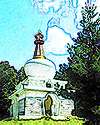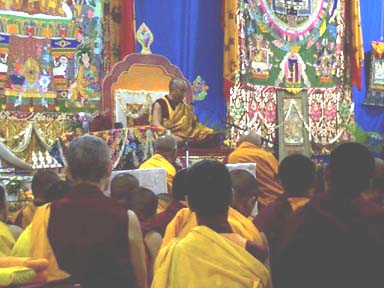GETTING TO KNOW US
-About the
TCC
-Thubten J. Norbu
-Our
mission
-Getting
Involved
-Gift
Shop
-Map
to TCC
-Pets
at the TCC
THE TCC GROUNDS
-Jangchub Chorten
-Kalachakra
Stupa
-Chamtse
Ling
-Retreat Cottages
-Grounds
stroll
EVENTS -PAST & FUTURE
-Event
Schedule
-Kalachakra
1999
-HHDL's
1996 Visit
-Medicine Buddha
Mandala
-Dorgyka Fire
Puja
-Event
Scrapbooks
TEACHINGS & SPEECHES
-Norbu's
1996 Speech to HHDL
-HHDL'S 1996 Teaching
-Aspirational
Bodichitta 1996
-Heart Sutra
3655 Snoddy Road
P.O. Box 2581
Bloomington, IN 47402
Fax: 812-335-9054
tcc@tibetancc.com


| page 1 | page 2 | page 3 | page 4 | page 5 |
- page 3 -
It is very important to understand your enemy. Though you may not be able to beat them, knowing their strength and qualities helps us to have confidence. We are already experts at expressing negative emotion; we don't need to work on that. The seventh Dalai Lama and the Kadampa Masters have advised us to notice what factors give rise to what emotions, and to become experts in this sense. We tend to have an attraction to anything we associate with ourselves, and repulsion for things associated with others. Nagarjuna once noted "to a mind that clings, why wouldn't afflictions arise?" Underlying emotion is the assumption that things exist independently. A belief in independent reality leads to a powerful emotional relationship with that reality. The quality of knowing is endless and beginningless. Is ignorance the same way? No -- powerful emotions are not in the mind at all times. In principle, they are separable from mind. Fundamental ignorance can be taken away, countered, as insight grows in power.
If we think there's no end to suffering, no possibility of freedom, this will lead us to desperation and even suicide. Some may think it's healthier to avoid contemplation of suffering. But when you appreciate that there is a possibility for release, this contemplation becomes a positive endeavor. The path of truth must be understood through experience. Imprints subtly obstruct full perfection. Within a single experience, we usually don't have direct realization but perceive only emptiness or conventional reality. We don't perceive both of these at once, or the unity of samsara and nirvana. Even wisdom realizing emptiness motivated by a desire to attain liberation is not enough -- we must be motivated by altruism. Our karmic accumulation must also be right. This is quite an amazing aspiration. There is no guarantee that faith alone in the dharma is firm. It needs to be grounded in understanding, which can only be gained after having a basic grasp of the whole path.
Questions from the audience, answered by H.H. The Dalai Lama:
1. How can we teach kids about afflictive emotions?
HHDL: You must relate the teachings to kids' own personal experience. Ask a child to remember if anger is a good or an unpleasant feeling, whether an angry family is happy. Not in order to judge but in order to understand. In school, kids already have some experience of ignorance and knowledge.
2. You advised us not to be skeptical but to have a reasonable doubt. To what degree should we doubt, then?
HHDL: This is an issue of language confusion. My advice was not to be an extreme skeptic. Generally, Buddhists do need some doubt. This is needed for applying critical reasoning to the Buddha's teachings, and for distinguishing between provisional and definitive teachings. We must determine experientially which is which. A hardened and self-righteous skepticism is what we must avoid.
3. How can we skillfully attack delusion without self-hatred?
HHDL: Even attacking delusion suggests caring for oneself. The goal is to rid yourself of unhappiness. One must differentiate the person from the act or motives. One must develop compassion, because that person is under the control of negative emotions. One must acknowledge the negativity, but know that we are not equivalent to that negative state of mind.
4. What can we do to prevent suicide?
HHDL: Even suicide is ultimately pointless in a Buddhist context! As I understand self-hatred, it arises out of an attachment to self and expectations of the self. This leads to self-judging. We must recognize the possibility of a better day.
Days Five and Six: A discussion of the proper order of meditations by His Holiness The Dalai Lama Suffering of change. We must understand the suffering of pervasive conditioning. We can imagine ourselves undergoing all sufferings, and then shift our focus to others to develop compassion. We must meditate on death for a sense of urgency, and in order to let go of attachments to immediate events and conditions. We also should have the right sequence of meditations. Consideration for others' welfare leads to nirvana for all. What is perfect enlightenment? It is impossible to judge the appropriateness of a teaching without being enlightened oneself. We should first be perfectly enlightened. One's own self-interest is served as a by-product of aspiring to Bodhicitta.
One needs to level feelings towards family and friends as well as towards enemies. In order to do this, you can visualize three individuals: one neutral, one friend, and one enemy. Allow normal reactions to these people to arise. Then, try to cultivate equanimity toward them -- the enemy was not born as our enemy. Due to conditions he is the enemy, but there is no absolute status to the person. Our friends as well -- we should examine the grounds for that emotion, and realize that later they may become our enemy. Equanimity can thus come. Use particular individuals so that you have concrete objects and not general ones; this is more effective. Next, take a model of someone who has been kind to you and cultivate affection and empathy. Then think that there isn't one person who hasn't been kind to us at one time in our lifetimes. Meditate on the kindness of others. All people contribute indirectly to our well being. Even on the path to enlightenment we depend on others. Altruism is only cultivated through meditation on others. Practice equalizing yourself with others. Fundamentally you are equal. Reflect on the pros and cons of self-cherishing and attachment. Cherish others' well being. Exchange the self for others. Practice giving and taking -- taking in others' negativity and suffering, and giving away the body, resources, etc. in a visualization. Eventually, learn to cultivate the Bodhicitta attitude.
| back to kalachakra 1999 index | back to main sitemap |
